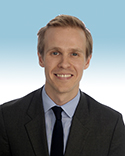The Other End of the Stethoscope
By Evan Joiner
 |
I receive a call from my father. His voice heavy and calm, he says my name as I pick up the phone. Am I someplace where I can talk?
There is news, unfortunately. A mass. He speaks with the same quiet reserve and scientific openness to
The surgeon, Viraj Master, has already called. It calms my father to know that Dr. Master advises the World Health Organization on renal cancer. They will meet tomorrow.
I bite my lip through the call, not wanting to burden him with my own fear at the thought of losing the man on the other end of the line.
The air in Atlanta is warmer than the air I left behind in New York. As I enter my father’s room, he sees me first. My mother is asleep in the chair beside him. He pulls me close, holds my head to his chest for a long time. He is still groggy, not long post-op, but he wants to show me his scars. He lifts his gown with pride to reveal three small holes, one for each trocar, and a large incision in the midline.
At 3 a.m., I awake uncomfortably in the chair beside him to the squeaky wheels of the phlebotomy cart. At its helm is a tiny woman cloaked in headscarf and accent and night. Anonymous, ageless, she is a gentle ambassador from a faraway place, destined to wander dim halls into dark rooms to draw the blood of the sick of this place. “You’ve done this before,” he tells her. I hear her smile in the darkness.
In the morning, the residents are nervous, untucked, their confidence and unquestioned authority unsettled by the presence of a senior member of the medical faculty in the bed before them.
When Master arrives, he is crisp, pressed, and wearing deep blue suit pants beneath his white coat. My father is in the chair. Master asks to sit on his bed. A foot below my father, he looks up at him to ask how he’s feeling. He proceeds to cite four articles in five minutes, one on the benefits of ice after abdominal surgery, another on
Later I return from the cafeteria to the sound of my father’s voice. He is on the phone with his nurse’s aide, calls her by name. He wonders if she’s free to take a walk. Of all the people on the floor, he has connected most with her, the lowest-paid member of the team, with the least training. By a twist, she is the one least afraid of him.
“They told me you would be trouble because you’re a doctor,” she tells him, “but you’re OK.”
They walk slowly, IV pole in tow. She insists he
But he is ready again an hour later. Two laps, then four.
I catch snippets of their conversation as they pass his room. She hopes to go into speech pathology if she can afford the training. “You’ll be good at that,” he tells her.
He begins to push himself to break his own record, a moving goalpost scrawled on the whiteboard in his room. Twenty laps to a mile. Thirty laps. Forty laps. Home.
My father is back at work now. His scans are clear three years out.
I am in my fourth year of medical school. As I walk the halls of my hospital, I often think of those nights I spent with him in his. I think, too, about what I’m looking for in medicine.
I enjoy the dynamic strength of its methods—the double edge of its empiricism—which damns it to abandon its most sacred truths as soon as still holier evidence comes to light. But I know that I am here for something loftier than a certain methodology and the mechanisms it illuminates.
I want to find, in the depth of a fluorescent night or the stillness of a linoleum day, some understanding of life and death, my own life, my own death, your life and your death.
I believe I have come to medicine looking for a kind of peace and purpose. I do wonder whether it lives here. What my father showed me—as he was learning to be a patient for the first time in a life full of patients—is that it does.
Evan Joiner is a medical student at Columbia University’s College of Physicians and Surgeons. His father, Emory Professor of Pediatrics Clinton Joiner, is director of the hematology program. This essay first appeared in the New England Journal of Medicine.





